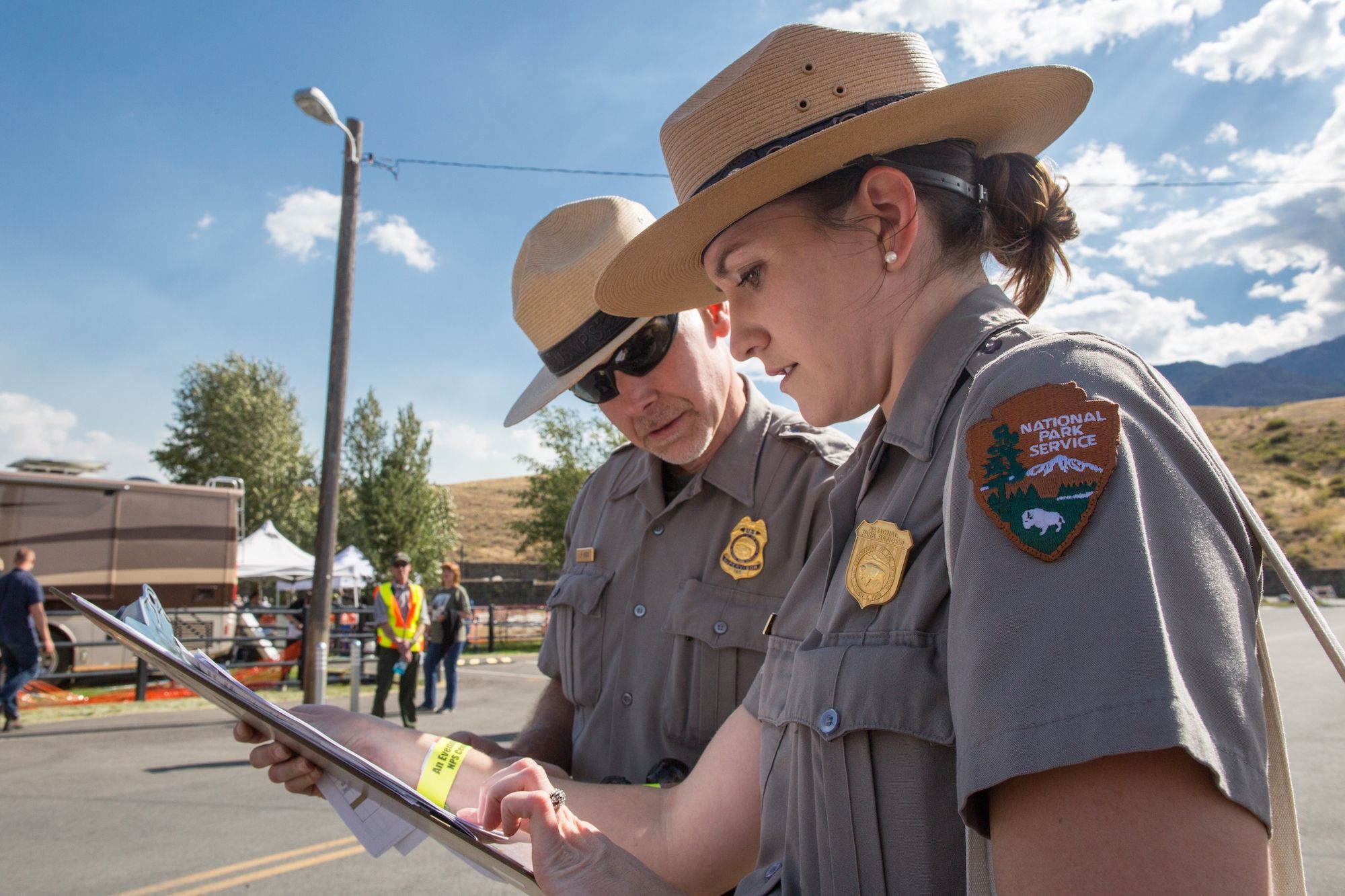
Law and Law Enforcement (Natural & Cultural Resources)
Within law and law enforcement jobs you will protect cultural, natural, and historical resources. You will conduct security evaluations, formulate security policy for DOI structures and procedures, and analyze the effectiveness of security practices. You will also maintain, test, and evaluate Physical Security components such as Access Control, CCTV, and Intrusion Detection systems. You may expand to preventing crime and maintaining law and order on public lands. Your presence can be a deterrent to wrongdoing, and help detect, investigate and respond to crimes ranging from misdemeanors to traffic, fish and game or tribal law violations, to felonies.
Industry Insights
A high-level pulse check on talent demand, projected growth, compensation, and how work typically happens across this pathway.
Estimated employment nationwide in 2024
BLS job outlook (2024–2034)
Mid-career annual salary (nationwide median)
How the work is typically performed
Shift‑based including nights and weekends
Active openings across the FireUp network
Career Pathways & Progression
Position Responsibilities
Entry‑level positions often serve as seasonal or trainee roles. Individuals patrol public lands, assist fully commissioned officers, interact with visitors, and learn field procedures under supervision. Trainees attend a Park Ranger Law Enforcement Academy (PRLEA) or state POST academy for approximately 650-680 hours and must complete background, medical, and fitness screenings.
Job Types & Titles
- Seasonal Law Enforcement Park Ranger (Type II Commission)
- Game Warden Recruit / Conservation Officer Trainee
- Law Enforcement Technician
- Park Ranger Intern
Qualifications Snapshot
Education
High school diploma or some college coursework in criminal justice, natural resources, or wildlife science.
Certifications
Completion of a Park Ranger Law Enforcement Academy (PRLEA) or state POST academy; CPR/First Aid certification; Wilderness First Responder (WFR) or Emergency Medical Responder (EMR).
Experience
No prior experience; internships or volunteer service in parks/wildlife agencies are beneficial.
Position Responsibilities
Technician‑level professionals are fully commissioned officers who patrol and enforce laws, investigate violations, collect evidence, and educate the public. Examples include state game wardens and federal law enforcement officers (GS‑05/07). Positions require successful completion of academy training and a bachelor’s degree in wildlife science, natural resources, criminal justice, or a related field. Officers typically complete the Land Management Police Training program at FLETC (approx. 83 training days) and additional field training.
Job Types & Titles
- Full‑time Law Enforcement Park Ranger (GS‑05/07)
- State Fish and Game Warden / Wildlife Officer
- Federal Wildlife Officer
- Wildlife Inspector
Qualifications Snapshot
Education
Bachelor’s degree in wildlife science, biology, natural resources, criminal justice, or a related field.
Certifications
Land Management Police Training (FLETC) or equivalent; Federal Wildlife Officer Basic Training; state POST certification; Wilderness First Responder or EMT; boating/snowmobile certifications as required.
Experience
1-3 years of on‑the‑job experience following academy graduation; seasonal or trainee experience counts toward this level.
Position Responsibilities
Professional‑level officers handle complex investigations, cross‑agency operations, and specialized duties such as wildlife crime investigation, cultural resource protection, and training. They may serve as criminal investigators (GS‑1811), special agents, or search‑and‑rescue coordinators. Candidates often hold advanced degrees and complete programs like the Criminal Investigators Training Program (CITP) and Federal Wildlife Officer Basic Training.
Job Types & Titles
- Special Agent (Fish and Wildlife Service)
- Criminal Investigator (U.S. Forest Service)
- Training Instructor / Academy Staff
- Search‑and‑Rescue Coordinator
Qualifications Snapshot
Education
Bachelor’s degree with some positions preferring a master’s degree in law enforcement administration, natural resource policy, or related fields.
Certifications
Completion of Criminal Investigators Training Program (CITP), advanced FLETC courses, specialized certifications (e.g., evidence collection, wildlife forensics).
Experience
3-5 years of law enforcement experience, including field patrol and investigative assignments.
Position Responsibilities
Management roles supervise teams and coordinate law enforcement programs across parks, forests, refuges, or state agencies. Chief Rangers, District Rangers, Captains, and Colonels oversee budgets, policy implementation, and interagency coordination. They may represent their agency at the national level and develop training and operational standards.
Job Types & Titles
- Chief Ranger / Park Superintendent
- Law Enforcement Supervisor (Captain/Colonel)
- Branch Chief - Law Enforcement Training
- Regional Law Enforcement Manager
Qualifications Snapshot
Education
Bachelor’s degree (master’s preferred) in natural resource management, public administration, or criminal justice; leadership and management training.
Certifications
Advanced law enforcement and leadership courses; agency management programs; FEMA National Incident Management System (ICS) courses.
Experience
5+ years of progressive law enforcement and supervisory experience.
Who Hires Law and Law Enforcement (Natural & Cultural Resources) Professionals?
Explore leading organizations in this field and discover career opportunities.

National Park Service - Law Enforcement Program
U.S. Forest Service - Law Enforcement and Investigations

U.S. Fish & Wildlife Service - Office of Law Enforcement

Bureau of Land Management - Law Enforcement and Security
National Park Service - U.S. Park Police

U.S. Army Corps of Engineers - Natural Resource Management
California Department of Fish and Wildlife - Law Enforcement Division
Georgia Department of Natural Resources - Law Enforcement Division

Florida Fish and Wildlife Conservation Commission - Law Enforcement

Kentucky Department of Fish & Wildlife Resources - Law Enforcement Division
Education & Certification
Lay the foundation for your career with the right education and stand out with professional certifications.
Academic Programs
Professional Certifications
Microcredentials & Specialized Training
Words from the Field
Hear from professionals who have built successful careers in law and law enforcement (natural & cultural resources).
Want to highlight your own pathway story?
Share your testimonialResources & Tools
Curated guides, videos, and communities to help you level up quickly.
Video Library
Member Spotlight
Member Spotlight
Jobs in Law and Law Enforcement (Natural & Cultural Resources)
Still Deciding?
Use our tools and resources to explore law and law enforcement (natural & cultural resources) and related fields.
Explore Your Options
Not sure where to start? Let us help you match your skills to your next career move, or get alerts for jobs that fit your goals.
